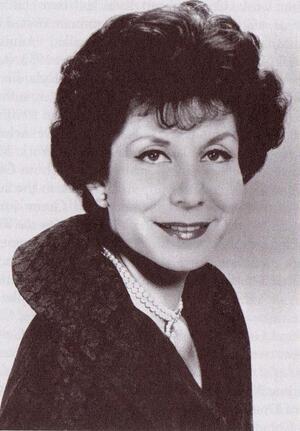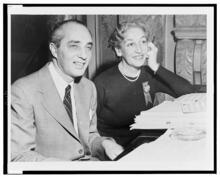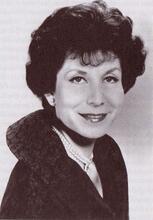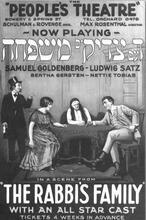Betty Comden
Betty Comden wrote lyrics and librettos for enduring and beloved musicals like Singin’ in the Rain and Peter Pan, winning some of the industry’s highest honors. After graduating from New York University, Comden formed a nightclub act called the Revuers with her future collaborator Adolph Green, Judy Holliday, and others. She and Green teamed up with Leonard Bernstein and Jerome Robbins to write On the Town, their first big hit, in 1944 and joined forces again with Bernstein in 1953 for the Tony-winning Wonderful Town, the same year Comden and Green won a Writer’s Guild Award for Singin’ in the Rain. Comden worked with Green for almost fifty years on different musicals, winning their final Tony Award together for The Will Rogers Follies in 1991.
Beginning with On the Town (1944) and continuing with The Will Rogers Follies (1991), Betty Comden’s long career as librettist and lyricist for Broadway and Hollywood included many classics of American musical comedy. With her partner Adolph Green, Comden wrote lyrics and/or librettos for such hits of stage and screen as The Barkleys of Broadway (1949), Singin’ in the Rain (1952), Wonderful Town (1953), The Band Wagon (1953), Peter Pan (1953), Bells Are Ringing (1956), the film version of Auntie Mame (1958), Say Darling (1958), Applause (1970), and On the Twentieth Century (1978).
Early Life and Family
Born Basya Cohen in Brooklyn, New York, on May 3, 1917, she was the second of two children in a comfortable middle-class family. Her father, Leo (Sadvoransky) Cohen, a lawyer, and her mother, Rebecca, an English teacher, were both Russian immigrants. The Cohens were observant Jews, keeping a Term used for ritually untainted food according to the laws of Kashrut (Jewish dietary laws).kosher home and lighting candles on the Sabbath. At age five, however, teased about her name by neighborhood children, Basya Cohen began to call herself Betty. Fourteen years later, Betty and her older brother Nat, then a medical student, changed their names from Cohen to Comden. That same year, Betty Comden, always sensitive about her nose, had plastic surgery. In her autobiography, Comden, who turned to Judaism sporadically in her adult life, commented that she still felt “uneasy in my skin,” remaining insecure about aspects of her identity.
Betty Comden always considered herself a performer. She first appeared on stage at the progressive Brooklyn Ethical Culture School, in a seventh-grade dramatization of Ivanhoe, in which she played the “Jewess” Rebecca. Teaching by dramatization was common at Ethical, and this early production is significant not only because it gave Comden her first experience of working in dramatic form and theatrical collaboration, but also because it represented to Comden a dichotomy between the clever brunette and the “beauteous” blonde heroine that appears in many of her later musicals. After attending Erasmus High School, Comden majored in drama at New York University, graduating in 1938.
Early Career
Comden’s professional career took off after meeting Green and Judy Holliday shortly after graduating from New York University. With two other partners, the group formed The Revuers and began their career as a nightclub act in 1938, writing their own material and performing first at the Village Vanguard and eventually at clubs on both coasts. Twenty years later, Comden and Green’s two-person act, A Party with Betty Comden and Adolph Green, won an Obie Award for Best Off-Broadway Musical.
In the eventful summer of 1938, Comden met Siegfried Schutzman, later Steven Kyle, whom she married three and a half years later. Comden’s personal life has often had to take a backseat to her extremely successful career, but Kyle, an accomplished artist who ran Americraft, a store for decorative accessories in New York, always supported his wife’s career, encouraging her to take risks and travel for her work. Comden and Kyle had two children: Susanna, whose birth in 1949 was commemorated in a composition by Leonard Bernstein called “Anniversary for Susanna Kyle,” and Alan, born in 1953. After thirty-eight years of happy married life, Kyle died in 1979 of acute pancreatitis. Comden’s son, Alan, suffered years of drug addiction and died of AIDS in 1990.
Career Successes and Collaborations
Comden’s friends and collaborators included the brightest stars of Hollywood and New York. Most important was Leonard Bernstein, with whom Comden had a close relationship dating back to the summer of 1938. In 1944, Comden and Green joined Bernstein and Jerome Robbins to write On the Town, the first great hit for each of the creative foursome, all still in their twenties. Directed by George Abbott, On the Town also featured Comden as Claire, the anthropologist, and Green as Ozzie, the sailor who looks like a prehistoric man. After many other successes, Comden and Green, in 1953, were asked again by George Abbott to work with Bernstein on music and lyrics for Wonderful Town, which won a Tony Award for Outstanding Musical, and for which Comden and Green won a Donaldson Award. That same year, they received the Best Written American Musical award from the Writers’ Guild of America for Singing in the Rain.
Comden’s many other tributes ranged from a Theatre World Award in 1945 to a Dramatists Guild Lifetime Achievement Award in 2002 (with Green), as well as joint Tony Awards for Hallelujah, Baby! (1968), Applause (1970), On the Twentieth Century (1978) and The Will Rogers Follies (1991). Adolph Green died in 2002. Comden’s best work was about New York, which she portrayed affectionately, always representing a human, personal experience of the big city, as in On the Town. In the same spirit, her work satirized the glamour of show business, including Hollywood and the movies, which she also loved. Singin’ in the Rain and The Band Wagon deflate the “stars” who grow too big for their britches with wit and compassion. In some ways, Comden herself seemed not unlike her filmic creation Auntie Mame, both bohemian and dignified, with an incisive sense of humor and a penchant for playing roles. Comden’s work privileged female characters who are clever, fast-talking, and humorous over tall, blonde, dumb starlets and narrow-minded debutantes who, in Comden’s work, always lose their man. In the final analysis, Betty Comden was one of the most important librettists in the history of American musical comedy, contributing a wit informed both by her liberal Jewish upbringing and her implicit belief that women need to assert themselves creatively.
Comden passed away on November 23, 2006, at the age of 89.
Selected Works by Betty Comden
The Bandwagon, with Adolph Green (1986).
Comden and Green Songbook, with Adolph Green (1992).
Off Stage (1995).
Singin’ in the Rain, with Adolph Green (1972).
Robinson, Alice M. Betty Comden and Adolph Green: A Bio-Bibliography (1994).
Styne, Jules. Bells Are Ringing (1957).







